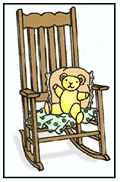|


|
|
 Crying
and Comforting ~ Newborn Crying
and Comforting ~ Newborn
Your baby is new. Give him all the love and comfort you can. If your
baby's needs are fully satisfied in these early months, he will be
less fussy and demanding later on. There is no such thing as "too
much" love as you and your baby get to know each other. You can't
"spoil" your new baby.
Crying
is your baby's way of letting you know what he needs or that he is
uncomfortable and distressed. Hunger, fatigue, too much stimulation,
digestive upsets--all are part of a new baby's day. Your baby communicates
that he needs you, and soon you will distinguish each cry and know
how to respond.
Gradually you will develop a repertoire of ways to comfort your baby.
You will know what will work with your baby in each situation. This
feels wonderful for both of you!
Every baby is unique and responds in his own way. Experiment and discover
what works best for your baby. This takes time and some trial and
error until you form your "partnership".
Everyone has some advice for new parents! Be open to what family,
friends, and books suggest. They may have some useful tips. Then choose
what feels right for you and your baby together. You are your baby's
parents!
New parents walk a hundred miles--all in their own home! Slow, rhythmic
steps, back and forth, daytime and nighttime have soothed many babies
and may work for yours.
Simply holding your baby close to you is also soothing for him. The
warmth of your body and sound of your heartbeat may be the easiest
way to comfort him.
Try "wearing" your baby. That way you can keep your hands
free to get on with other things. Use your baby carrier at home as
well as for going out. Each parent may need a carrier that is comfortable
to use.
Rocking babies is a tried-and-true cure for baby distress. Try rocking
him in your arms, sitting in a rocking chair, or holding him tight,
as you sway back and forth.
The touch of your hand may also soothe your baby. Try slow, gentle,
patting or smooth circular rubbing on his back. See what your baby
responds to.
As your baby gets a bit older, he may enjoy being gently bounced on
your lap or in the air. Some babies love it and find the distraction
fun, others definitely do not. Follow your baby's lead.
Your baby loves the sound of your voice--use it to let him know you
are there. And, remember to sing! Lullabies, nursery rhymes, the top
ten, or your favorite opera all sound wonderful to your baby when
the voice is yours. Ask your parents what they sang to you when you
were little. Make up your own songs, too.
Some babies eventually discover their own fingers and are able to
comfort themselves. This is a big step forward!.
|